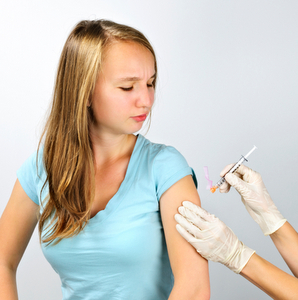 Clinician-scientists in the Faculty of Medicine are leading a new study that seeks to determine whether two or three doses of the vaccine Gardasil provide similar protection against human papillomavirus (HPV).
Clinician-scientists in the Faculty of Medicine are leading a new study that seeks to determine whether two or three doses of the vaccine Gardasil provide similar protection against human papillomavirus (HPV).
HPV infections cause nearly all cases of cervical cancer, which is the second most commonly diagnosed cancer in women worldwide.
“The HPV vaccine is very effective at providing immunity against the disease,” says Simon Dobson, the study’s lead co-investigator and a Clinical Associate Professor in the Department of Pediatrics. “If we find that two doses are effective, then it would mean fewer needles for girls receiving the vaccine, as well as cost savings for the health care system.”
“Earlier studies have shown that two doses of Q-HPV vaccine are as protective as three doses for up to 36 months,” says Dr. Dobson, who is a clinical investigator at the Child & Family Research Institute and an attending physician in pediatric infectious diseases at BC Children’s Hospital. “We want to ensure that over the longer term, two doses remain effective.”
The study will last up to 10 years, varying from girl to girl, and 8666 girls born between 1997 and 2000 will be recruited to participate in the study from five centres across Canada. The Vaccine Evaluation Centre at the Child & Family Research Institute at BC Children’s Hospital is recruiting 3609 participants.
To participate in the study, visit www.questhpvstudy.ca or call 604-875-2000 ext. 6501, or toll free 1-866-502-2424.
Half of the participants will have received two doses of the quadrivalent HPV (Q-HPV) vaccine and half will have received three doses, mostly in publicly provided immunization programs in the various provinces.
Girls participating in the study will complete an annual survey designed to address risk factors for getting HPV disease. Beginning in the year that they turn 15 and continuing for five consecutive years, girls will self-collect vaginal swabs and send them to the study lab, which will test for HPV and determine whether the number of doses received to date have offered adequate protection. There are also two optional blood samples that will be tested for levels of immune protection against HPV.
The study is designed to assess risk for HPV disease, HPV prevalence, and the levels of protection provided by two doses compared to three doses of the vaccine.
This study has been funded by the Michael Smith Foundation for Health Research (MSFHR) as part of a long-term HPV vaccine evaluation project. The study builds on earlier research funded by MSFHR at the request of the provincial health officer that demonstrated the effectiveness of a two-dose vaccine regimen in conferring immunity.
The study’s co-principal investigators are Gina Ogilvie, the Associate Professor of Family Practice and medical director of Clinical Prevention Services at the BC Centre for Disease Control (BCCDC), and Professor of Pathology and Laboratory Medicine Mel Krajden, the medical director of Hepatitis Services at BCCDC.
Contributions to the study have also been received from the BC Centre for Disease Control Foundation for Population and Public Health, and the HPV vaccine evaluation and research fund set up by the Governments of British Columbia, Alberta, Saskatchewan, Manitoba, New Brunswick, PEI, Newfoundland, Labrador, Yukon, and Nunavut. Additional funding will be provided by the Quebec Ministry of Health and Social Services.
